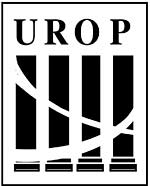While working on a research abstract about consumer habits, sophomore Alan Tsang came to a conclusion he didn’t expect: Pursuing a career in finance solely for the money isn’t for him.

Tsang now is considering a career in marketing, thanks to the stimulating research opportunity in the Undergraduate Research Opportunities Program (UROP), which is celebrating its 15th year.
“This was something I could get really excited about,” said the 19-year-old, who is assisting with the project “Ridicule as a mechanism for consumer socialization: Insights from insults among boys,” with David Wooten, an assistant professor of marketing. The research looks at how men ages 18-25 reacted to different items, mainly clothes, and how peer influence played a role in the consumer socialization process.
Tsang was among approximately 600 students who showcased their work on posters or through oral presentations during UROP’s annual recognition program April 4 in the Alumni Center and Michigan League.
UROP creates research partnerships between faculty and first- and second-year students. About 1,000 students and 450 faculty sponsors participate in the program, which has ranked No.1 in the U.S. News & World Report category Undergraduate Research/Creative Projects. All U-M schools and colleges are active partners in UROP, which aims to inspire students to “discover the world of research.” Some projects included:
• Maintaining transgenic mice express human prostate specific antigen and human T cell, histocompatibility proteins for prostate cancer vaccine development
• Saliva viscosity/swallowing success quantitative analysis study
• The effects of botox and strength training on the gait of children with cerebral palsy
• Do infants understand human behavior on video?
• Dust devils and dust storms on Earth and Mars.
A student spends eight to 12 hours per week on research assignments. One program benefit is that students interact with faculty, who often serve as mentors, said UROP director Sandra Gregerman.
Wooten, who works with three students on his project, said the program has been rewarding because students offer different perspectives and experiences regarding his research.
Another U-M professor, Paul Huth, said students played an important role with his work by conducting research for his two books.
“If I only relied on working [alone], I would have collected less data and the quality would have been lowered,” said Huth, a professor and senior research scientist at the Center for Political Studies.
Huth has been active in UROP since the program began in 1988. He mentors 12 students involved in three projects.
During the event, seven faculty received awards for their success as mentors, as nominated by students. Outstanding research mentors were Edward Chang, assistant professor, psychology; R. Paul Drake, professor, atmospheric, oceanic and space science; Daniel Fisher, professor, ecology and evolutionary biology, and geological sciences; Peggy McCracken, associate professor, women’s studies and romance languages; Larry Rowley, research fellow, Center for Afroamerican and African Studies; Russell Taichman, associate professor, dentistry; and Jennifer Vannest, post-doctoral fellow, psychology.
Receiving awards for 15 years with the program were Bruno Giordani, associate professor, psychiatry; Nancy Houk, research scientist emerita, astronomy; Huth; W.J. McKeachie, professor, psychology; Bryan Pfingst, professor, otolaryngology; Marilyn Shatz, professor, psychology; and Warren Whatley, professor, economics.

